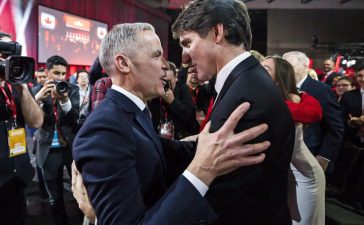Global stocks have fallen sharply and the US dollar hit a six-month low after Donald Trump unveiled sweeping tariffs against the US’s global trade partners in a move that is expected to upend supply chains and cause economic turmoil.
European markets were down across the board on Thursday after a sharp sell-off across Asia and US futures signalled similar falls when Wall Street opens.
In London, the FTSE 100 fell 1.5%, Germany’s Dax was down 2.3% and France’s CAC was off 2.5%.
The dollar sank nearly 2% against a basket of foreign currencies including the pound, which was up more than a cent and a half at $1.3148. Deutsche Bank sent a note warning clients to “beware a dollar confidence crisis”.
City of London investors raised bets on interest rate cuts by central banks, as policymakers try to fend off a global recession. The money markets are now pricing in a 92% chance that the European Central Bank cuts eurozone interest rates at its meeting later this month, up from 80% on Wednesday.
The chances of a Bank of England rate cut in early May have also risen, to 77%.
It followed a major sell-off in Asia where trading partners were hit with some of the highest tariff rises above the baseline 10% applied to imports from all countries selling goods to the US.
Overnight, Japan’s Nikkei and Topix fell 3.3% and 3.5%, respectively after the US president applied a 24% tariff on the country. Hong Kong’s Hang Seng was down 1.9%, while the stock market in Vietnam – which was hit with 46% tariffs – tumbled 6.7%.
US futures also suffered, with the Dow futures pointing at losses of 2.7% and the broader S&P 500 futures falling about 3.4%. The tech-focused Nasdaq index was down 3.8% pre-market.
Futures for Nasdaq were the hardest hit of the three main markets, down 3.5%, with constituents such as Apple – which still has large exposure to China – plunging 7%. Nike took a similar dive of 7.3%, the AI chip maker Nvidia dropped 5.6% and Tesla tanked more than 8%.
after newsletter promotion
Adam Hetts, a portfolio manager at Janus Henderson Investors, said markets were unlikely to calm down anytime soon.
“Eye-watering tariffs on a country-by-country basis scream ‘negotiation tactic’, which will keep markets on edge for the foreseeable future,” he said. “Fortunately, this means there’s substantial room for lower tariffs from here, albeit with a 10% baseline in place.”
“We’ve seen the administration have a surprisingly high tolerance for market pain, now the big question is how much tolerance it has for true economic pain as negotiations unfold.”
Oil prices also fell, with a barrel of Brent crude down 5.8% at $70.61 amid fears that sweeping tariffs would trigger a global recession, dampening energy demand.
Meanwhile, investors flocked to “safe” assets, such as gold, for which prices reached a record high of $3,167.50 overnight.
Tony Sycamore, an IG market analyst, said: “The tariff rates unveiled this morning far exceed baseline expectations, and if they aren’t negotiated down promptly, expectations for a recession in the US will rise dramatically.”







